

NO ESCAPE: Greenpeace points finger at Sime's Indon unit for recent haze. PETALING JAYA ― Environmental activist movement Greenpeace has released data purportedly showing the presence of hotspots within the land of a Sime Darby subsidiary in Indonesia that was previously given the all-clear by a palm-oil industry group.
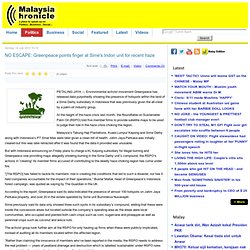
At the height of the haze crisis last month, the Roundtable on Sustainable Palm Oil (RSPO) told five member firms to provide satellite maps to be used to judge their role in the haze crisis choking the region. Malaysia’s Tabung Haji Plantations, Kuala Lumpur Kepong and Sime Darby along with Indonesia’s PT Sinar Mas were later given a clean bill of health. Jatim Jaya Perkasa was initially cleared but this was later retracted after it was found that the data it provided was unusable. According to the report, Greenpeace said its data indicated the presence of almost 100 hotspots on Jatim Jaya Perkasa property, and over 20 in the estate operated by Sime unit Bumireksa Nusasejati. Malay Mail. Wilmar to cut off palm suppliers caught burning in Indonesia.
Wilmar International Ltd (Wilmar), the world’s largest palm oil trader, plans to cut ties with Indonesian suppliers that clear land with illegal fires after blazes engulfed Singapore in a record haze.
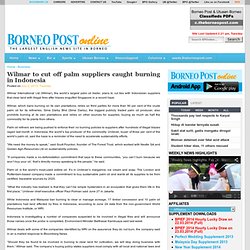
Education key to fighting haze. Liberia: Sime Darby's Slave Camp Is Another Face of Corporate Evil. A Malaysian company that came to Liberia in 2009 and acquired huge land space, promised to plant about 20,000 hectares to do Liberia proud by investing in oil palm and ease Liberia unemployment crisis is today embroiled in controversy and internecine conflict.
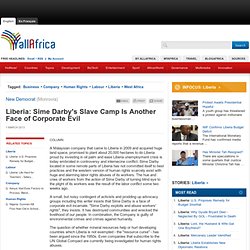
Sime Darby located in some remote parts of Liberia has not committed itself to best practices and the western version of human rights scarcely exist with huge and alarming labor rights abuses of its workers. Liberia: Strike Continues At Sime Darby. Normal work at the Sime Darby Plantation in western Liberia has been stalled for the second week running, affecting the company's operations.
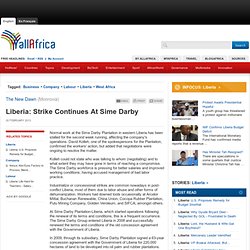
David Kolleh, one of the spokespersons for the Plantation, confirmed the workers' action, but added that negotiations were ongoing to resolve the matter. Kolleh could not state who was talking to whom (negotiating) and to what extent they may have gone in terms of reaching a compromise. The Sime Darby workforce is pressing for better salaries and improved working conditions, having accused management of bad labor practice. Industrialize or concessional strikes are common nowadays in post- conflict Liberia, most of them due to labor abuse and other forms of dehumanization. Workers had downed tools occasionally at Arcelor Mittal, Buchanan Renewable, China Union, Cocopa Rubber Plantation, Putu Mining Company, Golden Veroleum, and SIFCA, amongst others.
Solutions to Deforestation. "I speak for the trees, for the trees have no tongues" -The Lorax, Dr.

Seuss Around the world, forests are being logged for timber and paper pulp and cleared to grow mono-crops like palm oil and soy while they are deteriorating from the impacts of global warming. Deforestation is a major driver of global warming, responsible for up to 20 percent of global greenhouse gas emissions–more than all the cars, trucks, planes, boats and trains in the world combined. Deforestation doesn’t just threaten our climate, it threatens the livelihoods of 1.6 billion people that rely on forests for food and economic activity. Forests also serve as habitats to rare and undiscovered animal and plant species and play a key role in providing water and preventing flooding and erosion. Ending deforestation and protecting forests will not only preserve biodiversity and defend the rights of forest communities, it is also one of the quickest and cost effective ways of curbing global warming.
Palm oil giant moves forward on zero deforestation initiative. Oil palm and forest in Borneo One of the world's largest palm oil companies has become the first to identify and disclose high carbon forests and peatlands in its concessions.
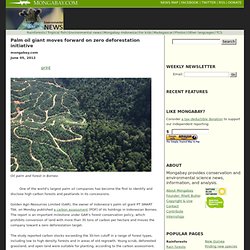
Golden Agri-Resources Limited (GAR), the owner of Indonesia's palm oil giant PT SMART Tbk, on Monday published a carbon assessment [PDF] of its holdings in Indonesian Borneo. The report is an important milestone under GAR's forest conservation policy, which prohibits conversion of land with more than 35 tons of carbon per hectare and moves the company toward a zero deforestation target. The study reported carbon stocks exceeding the 35-ton cutoff in a range of forest types, including low to high density forests and in areas of old regrowth. Palm Oil Set for First Weekly Drop in Four on Inventories. Palm oil headed for the first weekly decline in four on speculation that stockpiles in Malaysia, the second-largest producer, may stay near a record as soybean harvests from South America increase global oilseed supplies.
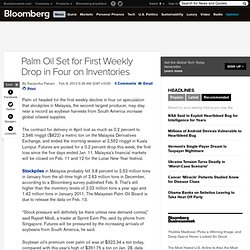
The contract for delivery in April lost as much as 0.2 percent to 2,546 ringgit ($822) a metric ton on the Malaysia Derivatives Exchange, and ended the morning session at 2,552 ringgit in Kuala Lumpur. Futures are poised for a 0.2 percent drop this week, the first loss since the five days ended Jan. 11. Malaysia’s financial markets will be closed on Feb. 11 and 12 for the Lunar New Year festival. Stockpiles in Malaysia probably fell 3.8 percent to 2.53 million tons in January from the all-time high of 2.63 million tons in December, according to a Bloomberg survey published Feb. 6. That’s still higher than the inventory levels of 2.02 million tons a year ago and 1.42 million tons in January 2011. Palm oil punch-up in Liberia [501822978. Photo©ROB MCNEIL/CI The fight between David and Goliath rolls on in Liberia as industrial agribusiness steamrolls over local communities.
Oil palm company Golden Veroleum, owned by US private equity fund Verdant Fund LP, has a 300,000ha concession. In October local activists complained to the Roundtable on Sustainable Palm Oil (RSPO) that the company had cleared land without giving public notice. Community leaders have been intimidated, and those talking to journalists arrested by local government officials. "These villagers have been trying to get their point across since 2010," says Alfred Brownell, a lawyer from Green Advocates who is representing the communities. "They have seen their drinking water diverted, they are now having trouble finding firewood and they no longer have land to farm. "Their only option is to work for Golden Veroleum for $3.50 a day, minus deductions for food and taxes.
" Palm Oil Seen Rising 16% by Year-End as China, India Recover. Palm oil, the world’s most-used cooking oil, may climb 16 percent this year as economies rebound in China and India, the biggest importers, the Indonesian Palm Oil Association said.
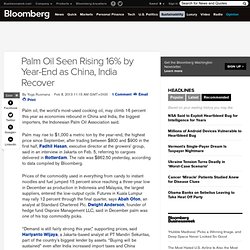
Palm may rise to $1,000 a metric ton by the year-end, the highest price since September, after trading between $800 and $900 in the first half, Fadhil Hasan, executive director at the growers’ group, said in an interview in Jakarta on Feb. 5, referring to cargoes delivered in Rotterdam. The rate was $862.50 yesterday, according to data compiled by Bloomberg.